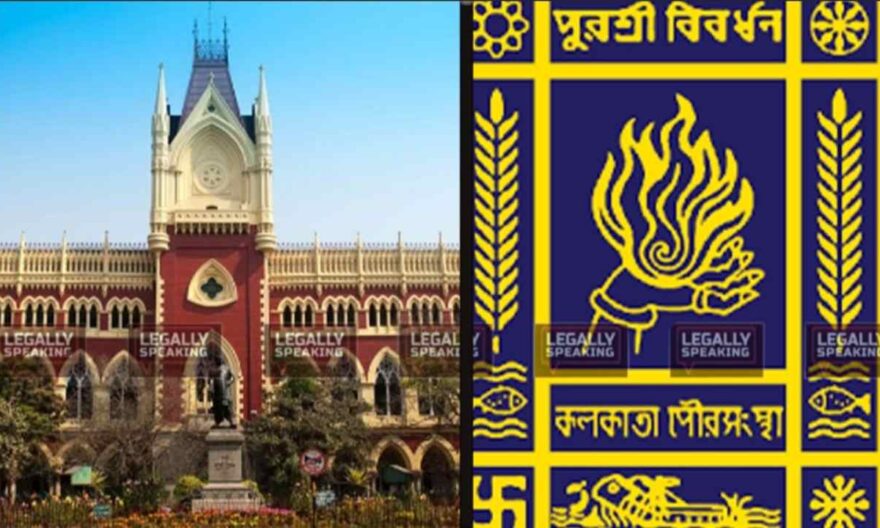
The Calcutta High Court recently warned the Kolkata Municipal Corporation (KMC) over its potential dissolution if it fails to take action against unauthorised street vendors, hawkers, and encroachers within the city.
A division bench of Chief Justice TS Sivagnanam and Justice Ajay Kumar Mehta was hearing a public interest litigation (PIL) filed by an advocate, which brought to the Court’s attention the proliferation of a motor vehicle spare parts market at Mullick Bazaar, leading to road congestion.
The bench took note of another case in which a lawyer expressed his inability to access his residence due to the presence of street vendors. The authorities’ response in that instance was that they were unable to intervene due to the bustling nature of the market area.
The Chief Justice subsequently urged the municipal corporation to take necessary measures to tackle the issue of unauthorised hawking and vending.
“Your State machinery has thoroughly failed (in implementing the law)…If you throw up your hands, then we will dissolve your municipality…[if you] are unfit to administer the municipal laws...admit that you are not able to implement the rules, then we will do [it]…We will dissolve the corporation and we will say, ‘the executives will run [it], the elected office bearers will not run the municipal corporation,” the bench stated.
Additionally, the bench emphasized that the current situation could have been improved if the State had established hawking committees to identify and relocate hawkers based on their specific categories.
“You did not constitute a hawking committee. 15 years back, if you had constituted, all of them (hawkers) would have been rehabilitated. Poor fellows, where will they go?…You have to face reality, some day some time,” Chief Justice stated.
The Court acknowledged that a report submitted in the case portrayed a deeply concerning state of affairs. The accompanying photos presented to the Court illustrated the lack of substantial efforts made to remove encroachers and regulate street hawkers effectively.
Specifically referring to Mullick Bazaar, the Court remarked that the individuals in question could not be classified as mere “hawkers” but rather as “blatant encroachers” of government-owned property.
The Court further observed that such a situation unfairly disadvantaged the shopkeepers who lawfully occupied property after fulfilling their rent, utility bill, and tax obligations for such usage.
“With all this, he (a shop owner) is trying to do business and the State turns a blind eye when a fellow (encroacher) puts a shop in front of his regular shops, blocks his access and does the same trade. And the State comes to say, ‘I will protect him (encroacher), not the person who got a municipal licence, electricity connection, pays professional tax, pays property tax and water charges and rent to the landlord…what is all this, sir?” the Chief Justice queried, adding that the State should stop rewarding encroachers by failing to act against them.
“The Court fails to understand as to why the Kolkata Municipal Corporation as well as police authorities are unable to regulate or evict the hawkers,” the bench pointed out.
Given this context, the Court directed the municipal authorities to carry out an eviction drive if the encroachers refuse to vacate the unlawfully occupied premises voluntarily.
The authorities were instructed to publicly announce that the encroachers, unauthorised vendors, and hawkers had a period of 10 days to vacate the premises. Failure to comply would result in eviction. If designated hawking zones were identified, the Court suggested relocating these individuals to such zones.
Furthermore, the Court observed that some encroachments extended from shops onto pavements and roadways. It mandated a 3-day deadline for the removal of such encroachments. Should the deadline be disregarded, the authorities were directed to remove them.
An action taken report is required to be submitted to the Court by July 17, detailing the measures implemented. The Chief Justice commented that if the authorities continued to neglect taking action against unauthorised vendors, it might be appropriate to bring these vendors to the premises of the municipal corporation.
“Take all those vendors to your municipal corporation office…Please ask you mayor, your chairman, ‘sir please remove all your cars, and in front let all the hawkers be allowed,” Chief Justice remarked.
In the alternative, the bench orally proposed that the corporation could establish a designated motor bazar. Under this arrangement, the spare parts vendors could be regularized as tenants and granted licenses to operate within that specific location. This suggestion aimed to provide a regulated space for their activities.




